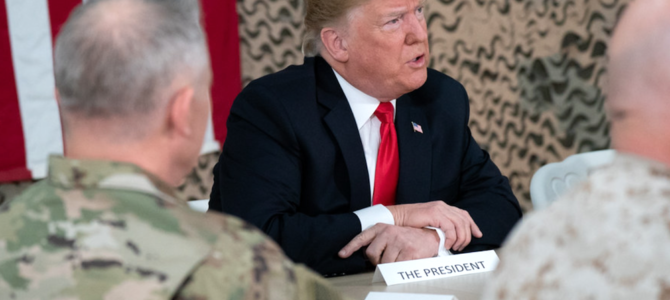Pentagon spokeswoman Cmdr. Jessica L. McNulty announced last week that the United States “continues to reduce our troop presence in Iraq from about 5,200 to 3,000.” In what should be a red flag to every American, she added that the United States remains committed “to ensuring the enduring defeat of ISIS and supporting Iraq’s long-term security, stability, and prosperity.” That is the job of the Iraqi military, however, and not a mission for the American Armed Forces.
While the reduction is helpful, the most appropriate action would be to immediately withdraw all the troops. Many in Washington continue to believe it is the responsibility of the United States to ensure the viability — if not the outright success — of the Iraqi government.
One fellow at the Institute for the Study of War reportedly claimed the reduction of U.S. troops was a mistake. By not working with the Iraqi government, the fellow argued, the Trump administration had let the political situation seriously decline, which aided the Islamic State.
It is important to note, however, that the American government doesn’t allow, direct, compel, or otherwise dictate what Iraq does with its internal politics. What Washington can and should do is enact policies that benefit the security and economic potential of our country. If the Iraqi government doesn’t do a good job protecting its people or providing for its prosperity, that’s on Baghdad. It should be painfully self-evident by now that we have neither the capacity nor the ability to keep any foreign government afloat at an acceptable cost.
Many pundits over the years have claimed Obama’s withdrawal from Iraq in 2011 “led to the rise of ISIS.” As I have previously explained in detail, the emergence of the Islamic State had nothing to do with America’s withdrawal and everything to do with the foolish policies enacted by former Prime Minister Nouri al-Maliki and the fatal practice of inserting unqualified men as senior generals who literally abandoned their men at the first sight of ISIS fighters in 2014.
Many claim we can’t withdraw from Iraq or Syria because if we do, ISIS will reconstitute. That is far from a given outcome, as the Syrian Democratic Forces, Russian, Syrian, and Iranian forces continue to hunt down ISIS in Syria, and Baghdad’s military will fight them in Iraq. American withdrawal in no way gives ISIS a free hand. It does, however, put the primary burden for eradicating them where it fully belongs: on the shoulders of those most at risk of ISIS, namely the Iraqi and Syrian governments.
More to the point, however, is that American security is not dependent at all on having troops deployed on any given battlefield abroad. The recent case of the “Beatles,” a group of ISIS fighters who spoke with British accents and brutally murdered innocents, provides a good example of how we can identify, target, and capture or kill any direct threat to America.
Local allies, Kurdish-led forces, captured the Beatles in early 2018 and eventually transferred them to U.S. custody. Their looming U.S. trial is a result of considerable diplomacy with the U.K. We did not need to have U.S. troops deployed in Syria to bring such barbaric men to justice. The mission to strike ISIS leader Abu Bakr al-Baghdadi is even more illustrative.
After years of trying to kill or capture the ruthless terrorist leader of ISIS, U.S. special forces finally killed him in October 2019. According to an analysis by the Associated Press, the mission “was the culmination of years of steady intelligence-gathering work — and 48 hours of hurry-up planning once Washington got word that al-Baghdadi would be at a compound in northwestern Syria.”
The Obama administration did virtually the same thing when it took out Osama Bin Laden in 2011. The same ability to use our powerful intelligence, surveillance, and reconnaissance tools, combined with an unrivaled ability to strike anywhere in the world, will continue to keep us safe — without any troops on the ground in Iraq.
Ignoring what has successfully kept us safe and instead insisting on costly military deployments will only perpetuate our failures. Rather than squander U.S. power by attempting to reform the politics of broken nations, the U.S. military should focus on targeted counterterrorism missions and raids that eliminate anti-U.S. threats.









